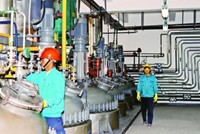Advertisement
Grab your lab coat. Let's get started
Welcome!
Welcome!
Create an account below to get 6 C&EN articles per month, receive newsletters and more - all free.
It seems this is your first time logging in online. Please enter the following information to continue.
As an ACS member you automatically get access to this site. All we need is few more details to create your reading experience.
Not you? Sign in with a different account.
Not you? Sign in with a different account.
ERROR 1
ERROR 1
ERROR 2
ERROR 2
ERROR 2
ERROR 2
ERROR 2
Password and Confirm password must match.
If you have an ACS member number, please enter it here so we can link this account to your membership. (optional)
ERROR 2
ACS values your privacy. By submitting your information, you are gaining access to C&EN and subscribing to our weekly newsletter. We use the information you provide to make your reading experience better, and we will never sell your data to third party members.
Business
Surviving The Cutthroat World Of Vitamins
International vitamin producers face up to fierce Chinese competition
by Jean-François Tremblay
September 18, 2006
| A version of this story appeared in
Volume 84, Issue 38

If you can't beat them, join them. this is why DSM and BASF, the world's largest sellers of vitamins, are producing or planning to produce bulk vitamins in China.
In the past 10 years, low-cost vitamins from China have wrecked the once-thriving European vitamin industry. Vitamins are still made in Europe and also in North America, but more and more of the nutrition supplements are made in China.
"New competitors emerge all the time, and recently they've been mostly in China," says Stefan Sommer, the Shanghai-based president of DSM China. "We see if we can compete, and if not, if we can collaborate."
DSM is seeking to spend $160 million to set up several joint ventures with North China Pharmaceutical Group (NCPG), in Shijiazhuang, a city located 175 miles southwest of Beijing. The money would get DSM a substantial stake, as much as 49%, in NCPG's vitamin C and vitamin B-12 operations as well as the Chinese company's anti-infectives operation, especially β-lactam and antibiotics. The Dutch company would also upgrade the Chinese firm's plants with new equipment and processes.
Sommer says the proposed deal, announced last October, is progressing slowly for a number of reasons. NCPG is a state-owned company, which means it makes decisions on its own time. But it is also listed on a stock market, so there are listing rules to comply with. What makes the deal most complex is its size and that China considers investment in its vitamin industry to be a sensitive matter. DSM will therefore need approval of the State Council, the country's highest decision-making body.
But it's important for DSM to have a reliable Chinese source of vitamin C, a major ingredient used in the company's profitable blended vitamin business. "It's difficult, if not impossible, for companies in Western countries to compete against Chinese ones in vitamin C," Sommer says. An illustration of that reality came late last year when BASF shut down a Danish vitamin C plant that employed 77 people. The German company does not have production facilities for vitamin C in China, but it has been producing vitamins A and E since 1999 in a joint venture with Northeast General Pharmaceutical in the Northeast China city of Shenyang. BASF became sole owner of the venture last year.
In written answers to questions, Christian Fischer, BASF's group vice president of fine chemicals in Asia-Pacific, notes that "China has developed a world-class two-step fermentation process for vitamin C." He says Chinese producers did not become competitive by stealing technology or neglecting environmental standards, the usual charges leveled at them.
Leo Hepner, a London-based management consultant who tracks the vitamin industry, begs to differ, saying Chinese companies have "stolen" their technologies from Western firms. "It's not their own," he says. Hepner also claims that Chinese producers are selling below their manufacturing costs, a practice known as dumping. "It's the Chinese way of doing business," he says.
As for environmental and safety standards, Hepner says, "they pay their workers almost nothing and pollute their rivers like we used to do in Europe 100 years ago." Although his charges are harsh, China's own State Environmental Protection Administration earlier this year called the country's chemical industry "unsafe" (C&EN, July 17, page 9).
Hepner declines to provide specific examples to illustrate his claim that Chinese producers are dumping vitamins on the international market. Information about the actual production costs of various vitamins, he says, is available in surveys he has conducted and sells. "For vitamin C, I know the manufacturing costs," he says. "I have been doing this for 35 years."
Chinese producers, including NCPG and Northeast General Pharmaceutical, rebuffed numerous requests to be interviewed for this article. C&EN contacted representatives from the companies in person at trade shows, by registered mail, and by e-mail, in English and Chinese.
Hepner isn't the only one who believes something is fishy about the low prices of Chinese vitamins. Pramod Yadav, president of intermediates, specialty gases, and vitamins at India's Jubilant Organosys, says China is particularly strong in the area of vitamins made through fermentation. Fermentation is an energy-intensive activity, he notes, and many Chinese producers get their electricity at subsidized rates.
Moreover, owing to lax enforcement of environmental laws in China, he claims, the cost of disposing of the considerable amount of wastewater generated by fermentation is minimal. Finally, Yadav says, vitamin producers get cheap financing. He maintains that it is not unusual in China for a bank official in charge of loan decisions to have a personal financial interest in the companies that are his customers.
DSM's Sommer says it would be futile to complain to Chinese authorities that the poor environmental practices of specific Chinese companies amount to unfair competition. "I could try to send spies to see whether this or that competitor is actually operating its water treatment plant. And then what? Complain to the local authorities that are linked to that plant?"
As for trying to prove in an international tribunal that Chinese vitamin producers are dumping, Sommer says that would require a complex legal process that he is not interested in undertaking. "We win over our competitors not by defeating them but by winning the customers," he proclaims.
Jubilant believes it has an edge over Chinese producers in the control it has over raw materials. The company produces niacin and niacinamide, two forms of vitamin B-3. It is able to compete with Chinese producers, Yadav says, because along with Reilly Industries, it is one of the world's largest producers of pyridine, the key raw material for vitamin B-3. "There are some small Chinese producers of B-3, but they must buy their pyridine either from us or from Reilly," he says.
Similarly, Fischer says BASF's vitamins A, E, and B-2 operations remain competitive against Chinese producers because BASF has economies of scale and integrated processes. Notably, it operates fermentation facilities in Gunsan, South Korea, that produce B-2 in a single step, a vast improvement over the eight-step chemical process it previously employed.
On the other hand, BASF buys vitamins B-1 and B-6 from various Chinese producers that, Fischer says, operate small-scale facilities in a competitive manner. He insists BASF buys only from companies that follow sound environmental and safety standards.
In recent years, DSM has been increasingly turning to China for ingredients to blend into the vitamin mixtures, or premixes, it sells to food companies. David Townsend, an Australian who is DSM's Shanghai-based manager of human nutrition and health for China, says DSM "basically started" the premix industry some 40 years ago. At the time, the business was owned by Roche; DSM acquired it in 2003.
DSM is the world market leader in this area, Townsend says, and enjoys a close relationship with food giants such as PepsiCo and Procter & Gamble. These companies are highly sensitive about their reputation with consumers and, for this reason, care more about reliability than cost when sourcing vitamin premixes.
Premixes are tailor-made for specific applications in a process that requires both knowledge of how vitamins are absorbed and a close relationships with customers. Townsend says Chinese producers pose no threat to DSM in this area, since most of them specialize in producing one or two bulk vitamins.
Ironically, whereas DSM has been hammered by Chinese producers in the bulk vitamin business, the company sees vast opportunities for its premixes in China. The market is growing at 25% annually, compared with world growth of just 3-4%, and the country already accounts for 25% of DSM's premix sales in Asia. With premixes, Townsend says, "whether we produce the bulk vitamins is important, but it's not critical."
The growth of premix sales in China is a bright spot in a vitamin market where management consultant Hepner says prices have been falling for years as a result of Chinese competition. His view is that "there is no reason they would not fall further." Vitamins may be good for you, but producing them—at least as a bulk commodity—is not.




Join the conversation
Contact the reporter
Submit a Letter to the Editor for publication
Engage with us on Twitter